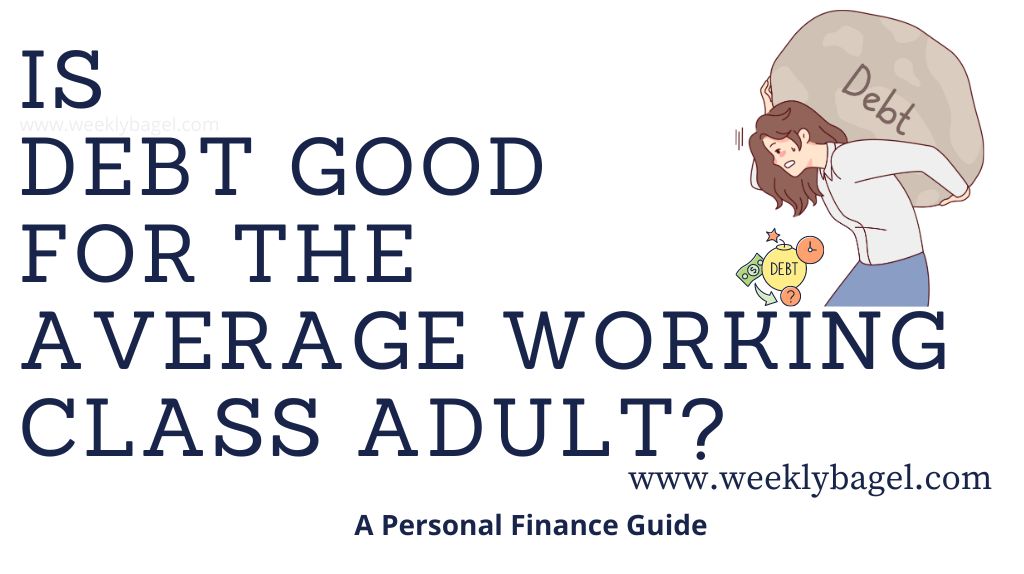
You may have heard it is good to carry debt. It is what is preached on most social media platforms by the so-called build-generation-wealth gurus. As a working class adult, I disagree debt is good for the average working class adult.
Unless you are building credit for the first time, buying a car or getting a mortgage, there is no reason why you should put yourself in a position of debt. This is because of the negative effects of debt on young working class American adults.
How Debt Affects Our Young Working Class American Adults
The average non-mortgage-carrying American Gen Z adult of age 18 – 25 years, has an average debt of $12,871. Millennials within the age bracket of 30 – 39 and 40 – 49 years, carry average debts of $26,532 and $27,838 respectfully. These statistics are from Debt Organization’s 2023 Demographics on Debt.
If the average debt for a 25 year old adult is $12,871, $36,712 per year as annual income will not cut it for such a working class adult. Monthly payment of the debt could lead to poverty for the debtor. This is especially, when current monthly cost of living is taken into consideration.
There are emotions associated with paying back such a debt for an average young American working class adult. One big health risk is called debt stress syndrome. A debt stress syndrome is stress caused by our financial debt. It poses a significant risk to our mental, physical and emotion wellbeing.
Having made this point on debt, is debt really that bad?
Well, this depends on your income-debt ratio. An income-debt ratio is your income relative to the debt you are about to carry. This is important, since it determines whether your debt poses a problem to your art of living. If your income is high and the potential debt is less than 36% of your income after tax, you can successfully pay it off with controlled monthly expenses.
Obviously, this would be difficult for the average working class who is not left with much after monthly expenses. Before I elaborate on the significance of income-debt ratio, I want you to know not all debts are there to destroy you. There are good debts and bad debts.
What Is Good And Bad Debt
Given the psychological burdens of debt, what kind of debts is good?
Good debts are debts, which can improve your living conditions with time. These kinds of debts usually have low interest rates with payments over a decade or so. Some good debt examples include federal student loans, real estate mortgages, short-term auto loans, business loan investment and other debts meant to have a positive effect in your life.
Undoubtedly, these examples of good debt can improve your life significantly with time. A student loan helps you acquire an education, which will increase your annual salary. Also, real estate mortgage and business tend to return profits, when both are managed well.
Do you see where I am going with this now, my good reader?
On the other hand, a bad debt slowly eats away your income. Unlike good debts, this kind of debt has high interest rates. Its payment period may be short or long, depending on the difficulty associating with its repayment. If you are having difficulties paying it, it is considered a bad loan.
Examples of bad debts include high interest loans from credit cards, pay-day stores, long-term auto deals, loan sharks and any debt you cannot afford to pay back without serious difficulty. These are things which ruin your credit score.
Listen, it is all about common sense. If a loan has high interest rate, short payment term, associated monthly fees and high debt-to-low-income ratio, forget about it.
This is the key to avoid bad debts. You can never go wrong with it. It is how you avoid being financially broke. Are you following me so far?
How Much Debt Is Healthy
Given we have explored the concepts of good and bad debts, how much debt is considered a lot for the average working class adult?
Your debt is considered a lot, when it exceeds 36% of your monthly income. This is according to the AARP Organization. Here is an example of what I mean by your monthly debt exceeding 36% of your monthly income.
Let us say you make about $6500 a month after tax. 36% of $6500 will be the equivalence of $2340. Your monthly debt payment should be this amount at most. This is because as your monthly debt gets close to 50% of your income, it becomes a majority of your expenses. And, you do not want majority of your monthly income to be dominated by debt repayment.
Unless you are already in some serious debt, giving away 50% of your monthly income as debt payment is totally outrageous. Is it not, my wise reader?
To put it in another way, it is the equivalence of working for your debt. This is because you give 50% of the income you take home to a creditor. I do not know about you, but as a part of the working class, I do not find it funny.
So yeah, be sure to keep this in mind when applying for loans and credit cards. Otherwise, you will find yourself working tirelessly for loan companies. It is how these loan companies make money.
Obviously, you are paying back money you borrowed from them. But sometimes, you can end up paying way more than you borrowed. This is especially with the penalty and junk fees attached to loans nowadays.
To Stay Out Of Debt Or Not To: Conclusion
From this article, you can discern I have bias towards being in debt. However, it does not mean I do not see average young working class Americans need to borrow to build their credit, buy cars or a house. The goal of this article, as with my entire professional blog, is to deter you from reckless borrowing.
Do you understand, good reader?
I want your conscience whipping with some horse lashes, each time you are about to make a loan decision which could endanger your financial future. This is especially in situations, where your annual income is significantly less than the debt you are about to borrow.
If you are a college student, I want you to see How Credit Card Companies Target College Students As Money Cows. As a hard working class adults, I want you to see through the gimmicks of those gurus encouraging the American working class to borrow for everything. I would like you to think the impacts of a debt before you borrow.
Unless it is a good debt, I would not recommend it. This is because what you consider a little debt, can eventually become a majority of your monthly expenses. Hence, why you should take your income and expenses into consideration prior to borrowing a loan.
Here is the key to avoiding debts. If you will have difficulty paying it back, forget about it. Either save the money to pay for it in cash, or just accept the fact you cannot afford it. There is nothing wrong with that.




 What Happens If I Stop Paying My Credit Card Debt
What Happens If I Stop Paying My Credit Card Debt